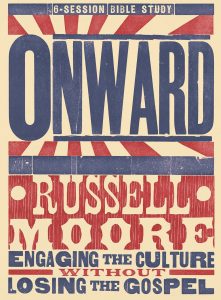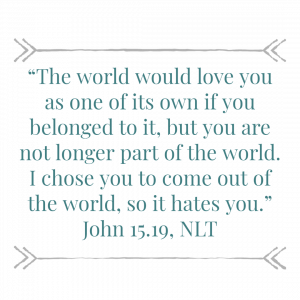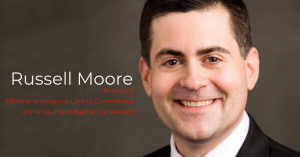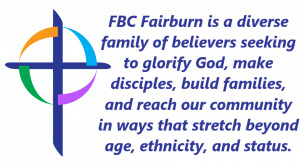The inside jacket caught my eye in a LifeWay store back in 2015. It read, “We can be Americans best when are not Americans first.” What struck me is how backwards that seems from the way we actually operate in this world. More often than not we will find that an honest assessment of our lives within the church holds being an American first and everything else a distant second. That includes our Christianity.
In his book, Onward, Russell Moore addresses exact ways that we can be a major influence in society as Christians simply by seeking God’s kingdom first. For Moore, the epicenter of our positions as Christians is not in politics or adapting to culture, rather it is in biblical theology and orthodox practice of evangelicalism. Moore challenges the idea of what it means to be progressive, citing William Jennings Bryan and Charles Spurgeon as being progressives of their day.[1] His point? The church in the 21st century will and must look different that the normal expectations of the culture for church. Denominations that have adapted to culture on issues of sex and morality are in sharp decline, where churches that hold to a tight interpretation of biblical parameters have experienced tremendous growth. The pastor of this church does not “look like his cuff-linked or golf-shirted forefathers…might preach forty-five minutes to an hour, sometimes calling out backsliding Christians with all the force of hellfire-and-brimstone revivalists of yesteryear. He is pro-life and pro-marriage, although he likely to speak of issues like homosexuality in theological and pastoral terms rather than in rhetoric warning of ‘the gay agenda.’”[2]
 I finally found much of who I am as a pastor and a preacher as I read these words. I have long struggled with the idea that Christ’s church holds more of the nationalistic ideals of Americanism than it often does of biblical Christianity. I have wrestled with the way ethnicity and social concern is wholesale ignored in many pulpits. It’s not that we are not concerned with social issues. We raise money and fight against abortion, as we should. It’s that the condition life for many in our community are vastly overlooked because of convenience. This does not mean that the church in America has not gotten many things right, it just means that the church in America must be more than a political wheelhouse. The Church in America must be about the Gospel that changes hearts as we move in action.
I finally found much of who I am as a pastor and a preacher as I read these words. I have long struggled with the idea that Christ’s church holds more of the nationalistic ideals of Americanism than it often does of biblical Christianity. I have wrestled with the way ethnicity and social concern is wholesale ignored in many pulpits. It’s not that we are not concerned with social issues. We raise money and fight against abortion, as we should. It’s that the condition life for many in our community are vastly overlooked because of convenience. This does not mean that the church in America has not gotten many things right, it just means that the church in America must be more than a political wheelhouse. The Church in America must be about the Gospel that changes hearts as we move in action.
Realistically, the fullest premise of Moore’s book rests on fully grasping what it means to be part of the Kingdom of God. Jesus said of Peter that on his confession of faith, he was given the keys to the Kingdom of God and that the gates of hell would not prevail against them (Matthew 16.13-20). This Kingdom building was to start here on earth in preparation for our inheritance in heaven. We do not think like that in the American church. We concern ourselves with the events of this world, the things we want to accomplish before we die. Sure, it is good to enjoy the world where we live, but our focus is not to be on what we accomplish here. As Moore states it:
“Unless corrected by a holistic vision of the kingdom, we will abstract the concerns of this stage of life from the next, because we will see no overlap between the two, except that this one is where we receive the gospel to ferry us over to the next. We will then misunderstand what the Bible means when it tells us to focus our minds on heavenly things, not on earthly things because our citizenship is in heaven (Phil. 3.18-20). We will ignore that Paul’s point is not that heaven is away from earth, but that Jesus is in heaven. Of heaven, Paul wrote: ‘and from it we await a Savior the Lord Jesus Christ, who will transform our lowly body to be like His glorious body, by the power that enables Him even to subject all things to Himself’ (Phil. 3.20-21). That’s why Jesus taught on ‘seeking first the Kingdom’ in the context of worry about economic provision (Matt. 6.33). If we don’t see how the ‘kingdom come’ informs this life now, we become frantic about the things of this life, wanting to make them ultimate. Or, we act as though justice and righteousness are irrelevant since, after all, what is really waiting for us is worship, so why should we be concernd about those who have no food or clothing, those whose lives are in jeopardy? Either by frantic engagement or disengagement with the communities around us, we become, to use a word we don’t often hear these days ‘worldly’. This means to be shaped to be shaped and patterned by the world around us…Worldliness means that we acquiesce to the priorities and the agenda of the systems now governing the world, in many cases because we don’t even question them.”[3]
Let’s take a quick step back and assess our lives. Herd mentality is a real thing. Too often we see events culminate and perpetuate because no one really challenged the system at play. Let’s go outside of the Church and look at world events that demonstrate this at work around us:
- The American slave trade from 1619 – 1865. Yes, there were people along the way that spoke up, but they were silenced or shunned. As abolition gained steam from the 1780s until the end of the Civil War in 1865, people began to find economic reasons to justify the practice. The dollar trumped justice.
- Jim Crow and segregation laws. From fear based rhetoric that dehumanized black men to mobs of white men and women that physically attacked black Americans for seeking equality, the mindset was accepted and not challenged…even in the church.
- Rioting and looting of businesses in our cities. It takes one act to open up the floodgates of raw emotion and even, though not equivocal, evil. What I mean is that not all acts in the protests and riots we have seen truly stem from a desire to engage in evil. Emotions have a way of causing us to act out in ways we would not otherwise engage. One person acting out of evil, in many (not all) cases around America have created a domino effect.
- The storming of the American embassy in Benghazi in 2012. Angst against America drove a mob mentality to exact works of evil against an ambassador.
The point is that it is easy to see everyone else doing something, even if it is wrong, and accept it without questioning the practice. And this happens in the church as well.
I fear that the Church of Jesus Christ has misinterpreted what the Bible teaches about life in this world. Jesus says to His 12 disciples in John 15.19, “If you were of the world, the world would love its own; but because you are not of the world, But I chose you out of the world, because of this the world hates you.”[4] We have considered that our position in life is to be nice, courteous, non-confrontational, and jovial. This is a misunderstanding of Paul’s words in Romans 12:18, “If possible, so far as it depends on you, be at peace with all men.” Paul may have been one of the most upfront and confrontational men of the early church, so he clearly isn’t suggesting to be a push over.
 Further, the Church in America has bowed to political gain and built a strange relationship with political parties that is foreign to the New Testament. I saw this week where a Baptist pastor in Atlanta has taken the stance that abortion is consistent with the Christian life by softening the sin with the term “reproductive justice.”[5] This comes with a desire to win his political party a seat in the US Senate. On the other side of the aisle, the Church has mixed the lines of patriotism and nationalism in a way that resembles the Emperor worship of the Roman civilization. No, I am not suggesting that Republicans are practicing cult prostitution or sacrificing meat to idols. However, it is evident that, even within the Church, the symbol of the flag has become the highest honor, even above human life and true instances of injustice. Don’t believe me? I have not yet seen any of my conservative, Republican Christian friends or acquaintances call out VP Mike Pence for his heretical commentary on the flag in which he took Holy Scripture about Jesus Christ, the true Savior, and replaced Him with “Old Glory.”[6] Any hinted equivocation of America or “Old Glory” with the Son of God must be called out and repudiated by faithful followers of Christ, but too many will not because this is the land that we love.
Further, the Church in America has bowed to political gain and built a strange relationship with political parties that is foreign to the New Testament. I saw this week where a Baptist pastor in Atlanta has taken the stance that abortion is consistent with the Christian life by softening the sin with the term “reproductive justice.”[5] This comes with a desire to win his political party a seat in the US Senate. On the other side of the aisle, the Church has mixed the lines of patriotism and nationalism in a way that resembles the Emperor worship of the Roman civilization. No, I am not suggesting that Republicans are practicing cult prostitution or sacrificing meat to idols. However, it is evident that, even within the Church, the symbol of the flag has become the highest honor, even above human life and true instances of injustice. Don’t believe me? I have not yet seen any of my conservative, Republican Christian friends or acquaintances call out VP Mike Pence for his heretical commentary on the flag in which he took Holy Scripture about Jesus Christ, the true Savior, and replaced Him with “Old Glory.”[6] Any hinted equivocation of America or “Old Glory” with the Son of God must be called out and repudiated by faithful followers of Christ, but too many will not because this is the land that we love.
It was an intentional move on my part to place this book from the Summer Reading Plan last because I know it will ruffle some feathers. Let me ask you to hear the point, because it does not matter if you are “Ridin’ with Biden” or giving a “Fist Bump for Trump”[7], both sides are guilty. This is why George Washington was opposed to political parties. Or, as Alexaner Hamilton wrote in the first of The Federalist Papers on October 27, 1787:
“So numerous indeed and so powerful are the causes which serve to give a false bias to the judgment, that we, upon many occasions, see wise and good men on the wrong as well as on the right side of questions of the first magnitude to society. This circumstance, if duly attended to, would furnish a lesson of moderation to those who are ever so much persuaded of their being in the right in any controversy. And a further reason for caution, in this respect, might be drawn from the reflection that we are not always sure that those who advocate the truth are influenced by purer principles than their antagonists. Ambition, avarice, personal animosity, party opposition, and many other motives not more laudable than these, are apt to operate as well upon those who support as those who oppose the right side of a question. Were there not even these inducements to moderation, nothing could be more ill-judged than that intolerant spirit which has, at all times, characterized political parties. For in politics, as in religion, it is equally absurd to aim at making proselytes by fire and sword. Heresies in either can rarely be cured by persecution.
And yet, however just these sentiments will be allowed to be, we have already sufficient indications that it will happen in this as in all former cases of great national discussion. A torrent of angry and malignant passions will be let loose. To judge from the conduct of the opposite parties, we shall be led to conclude that they will mutually hope to evince the justness of their opinions, and to increase the number of their converts by the loudness of their declamations and the bitterness of their invectives.”[8]
Hamilton’s point was that we are prone to discount someone’s opinion because of a political affiliation. Sadly, that is the Church in America. I have seen too many Christians draw a line in the sand over a political party or candidate. You have as well. Scroll Facebook or Twitter. You see statements like, ”If you aren’t voting for ______, then unfriend me” or “If you don’t agree with my stance on this issue, we can’t be friends”. Maybe it’s the passive version that says “here is my political choice/candidate/affiliation, this should clear up my friends list”. I have many friends on both sides of our political spectrum and I don’t agree with most of them either way!
 One of the reasons that Moore’s work resonates with me is the call it places on the Church to get back to the Gospel. If you are a Christian, you cannot (yes, I will use that strong of a word) feel at home in either political party. That is friendship with the world. If you are a Christian, you cannot (again, strong word) feel at home in America. THIS IS NOT YOUR HOME! You are, as Peter says, “aliens and strangers”[9] in this world. You are an immigrant passing through, seeking to take others with you to your true home. This is why we have a necessary friction with the world around us. It is why, as Moore states, “as technology advances, our advocacy for human life has become in many cases stranger and stranger to the world around us, as we advocate not only for late term infants in the womb but for those ‘embryos’ who are sacrificed for medical research or for fertility treatments. We argue not only against abortion ‘for birth control,’ but for the sacrificing of human life for what seem to be heroic causes: the curing of diseases, the providing of children to infertile families, the advance of the human race into new vistas of evolutionary progress.”[10] This is human dignity. It is the same view of human dignity that calls the Church to rise against racial injustice. We have to see both sides. Human lives are not political pons in the Church.
One of the reasons that Moore’s work resonates with me is the call it places on the Church to get back to the Gospel. If you are a Christian, you cannot (yes, I will use that strong of a word) feel at home in either political party. That is friendship with the world. If you are a Christian, you cannot (again, strong word) feel at home in America. THIS IS NOT YOUR HOME! You are, as Peter says, “aliens and strangers”[9] in this world. You are an immigrant passing through, seeking to take others with you to your true home. This is why we have a necessary friction with the world around us. It is why, as Moore states, “as technology advances, our advocacy for human life has become in many cases stranger and stranger to the world around us, as we advocate not only for late term infants in the womb but for those ‘embryos’ who are sacrificed for medical research or for fertility treatments. We argue not only against abortion ‘for birth control,’ but for the sacrificing of human life for what seem to be heroic causes: the curing of diseases, the providing of children to infertile families, the advance of the human race into new vistas of evolutionary progress.”[10] This is human dignity. It is the same view of human dignity that calls the Church to rise against racial injustice. We have to see both sides. Human lives are not political pons in the Church.
In short, this work may be one of the more influential books I have read as it pertains to Christians and public policy. Yes, it will go against the grain of much of what we are conditioned to believe and how we are conditioned to think. However, Russell Moore does incredible biblical scholarship in placing these ideals before us. Whether you are a Republican or a Democrat, I challenge you to read this book before the election. Thinking through how the Gospel affects our approach to culture is massive, but it is what we are called to do. In the words of Russell Moore, “Keep Christianity strange.”[11] Read the book to find out why!
This book is available on Amazon: https://tinyurl.com/y2baqsy2

[1] Russell Moore, Onward: Engaging the Culture without Losing the Gospel (Nashville: Broadman and Holman Publishing, 2015), 20.
[2] Moore, 21.
[3] Moore, 52-53.
[4] Unless otherwise noted all Scripture references from The New American Standard Bible ©1995 The Lockman Foundation. Used by permission.
[5]https://blackchristiannews.com/2020/08/raphael-warnock-georgia-pastor-running-for-senate-says-his-support-for-abortion-is-consistent-with-his-beliefs-as-a-minister/
[6] https://relevantmagazine.com/culture/vice-president-mike-pence-swapped-out-jesus-for-old-glory-in-his-rnc-address/
[7] I admit, Biden’s slogan is real. I made up the Trump one…maybe it will catch on and I can sell hats or shirts, not as an endorsement of a candidate, but to make money. Also, if you read this and steal my idea, you are agreeing to terms that I get 50% of your profits.
[8] Alexander Hamilton, “No. 1,” in The Federalist Papers, Signet Classics edition, ed. Clinton Rossiter (New York: Penguin Publishing, 1961), 28-29.
[9] 1 Peter 2.11.
[10] Moore, 136.
[11] Moore, back cover of the book.
